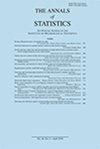序列可忽略性条件下部分观察马尔可夫决策过程的偏离策略评价
IF 3.7
1区 数学
Q1 STATISTICS & PROBABILITY
引用次数: 11
摘要
假设底层系统可以被建模为部分观察马尔可夫决策过程(POMDP),我们考虑在顺序可忽略性条件下动态处理规则的离策略评估。我们提出了一个估计器,部分历史重要性加权,并表明它可以一致地估计目标策略的平稳平均奖励,给定足够长的行为策略。我们提供了其误差的上界,该误差随观测数(即轨迹数乘以其长度)的多项式衰减,其指数取决于目标和行为策略的重叠以及底层系统的混合时间。进一步,我们证明了这种收敛速度是极小极大的,只给我们的假设混合和重叠。我们的研究结果表明,pomdp中的off-policy评估比(完全观察到的)Markov决策过程中的off-policy评估严格困难,但比无模型的off-policy评估严格容易。本文章由计算机程序翻译,如有差异,请以英文原文为准。
Off-policy evaluation in partially observed Markov decision processes under sequential ignorability
We consider off-policy evaluation of dynamic treatment rules under sequential ignorability, given an assumption that the underlying system can be modeled as a partially observed Markov decision process (POMDP). We propose an estimator, partial history importance weighting, and show that it can consistently estimate the stationary mean rewards of a target policy, given long enough draws from the behavior policy. We provide an upper bound on its error that decays polynomially in the number of observations (i.e., the number of trajectories times their length) with an exponent that depends on the overlap of the target and behavior policies as well as the mixing time of the underlying system. Furthermore, we show that this rate of convergence is minimax, given only our assumptions on mixing and overlap. Our results establish that off-policy evaluation in POMDPs is strictly harder than off-policy evaluation in (fully observed) Markov decision processes but strictly easier than model-free off-policy evaluation.
求助全文
通过发布文献求助,成功后即可免费获取论文全文。
去求助
来源期刊

Annals of Statistics
数学-统计学与概率论
CiteScore
9.30
自引率
8.90%
发文量
119
审稿时长
6-12 weeks
期刊介绍:
The Annals of Statistics aim to publish research papers of highest quality reflecting the many facets of contemporary statistics. Primary emphasis is placed on importance and originality, not on formalism. The journal aims to cover all areas of statistics, especially mathematical statistics and applied & interdisciplinary statistics. Of course many of the best papers will touch on more than one of these general areas, because the discipline of statistics has deep roots in mathematics, and in substantive scientific fields.
 求助内容:
求助内容: 应助结果提醒方式:
应助结果提醒方式:


